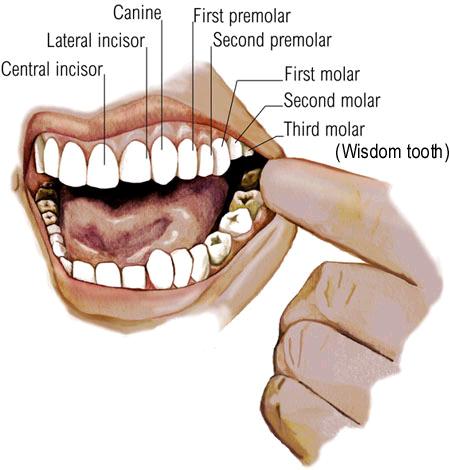Treatment for nondental causes of molar pain involve management of the underlying medical disorder. For example, sinusitis-related tooth pain is often treated with antibiotics, decongestants and salt water rinses. A wisdom tooth or third molar is one of the three molars per quadrant of the human dentition. It is the most posterior of the three.
The age at which wisdom teeth come through is variable, but generally occurs between late teens and early twenties.

Molar pain may be related to your teeth or it could be caused by an unrelated condition. The pain caused by pressure on the periodontal ligament and alveolar bone from the cytokines released by osteoclasts, which are responsible for bone destruction. We call these wisdom teeth. As the dictionary definition suggest, the primary purpose of molars is to chew food.
Common Causes of Molar Toothache. There are a variety of reasons why your molars may begin to pulse with pain , throb, ache, or generally become irritated. Pain , swelling and trismus are common complications associated with third molar surgery.
These complications have been reported to have an adverse effect on the quality of life of patients undergoing third molar surgery.
To review the different modalities. Impacted wisdom teeth is a disorder where the third molars (wisdom teeth) are prevented from erupting into the mouth. This can be caused by a physical barrier, such as other teeth, or when the tooth is angled away from a vertical position.
Are you feeling pain in your molar teeth? Molar pain can be associated with other inconvenient symptoms, such as pain with exposure to hot or cold or when biting down, gum swelling, bad breath, and more. Wisdom tooth are the last to erupt in oral cavity. They are usually accompanied by severe pain in back molars.
Special care has to be taken after wisdom teeth removal like cold compress, mouthwash, flossing and rising with warm saline water. The reported frequencies of complications after third molar removal are reported between 2. The spectrum of complications range from minor expected sequelae of post-operative pain and swelling, to permanent nerve damage, mandibular fractures, and life threatening infections. How would you like a stronger immune system or better sleep? Action between the sheets can help you get all of this and more. The methodology used in this study is an adaptation from the protocol used by Ata-Ali et al.
After dental extractions and third molar (wisdom tooth) removal a certain amount of bleeding, discomfort or pain , and swelling is normal. The following instructions are provided to make your post-operative recovery as short and pleasant as possible. Referred to as your third molars, these four teeth begin to push through the skin like any other tooth, which can cause pain.
All third molar teeth should be managed by a qualified dentist. Oral and maxillofacial surgeons surgically manage acute, chronic and potential pathological conditions of third molar teeth. Third molar therapy is an evidence-based treatment paradigm.
You could try wearing a gum guard or a bite-plate, because in some cases, altering your bite even temporarily can stop pressure from being applied to the affected area and causing more pain. Surgical removal of impacted third molars is one of the most common procedures carried out in oral and maxil-lofacial surgery. Most third molar surgeries are performed without complications.
One new product that is proving to be effective in pain management following third molar surgery is a combination of a long-acting local anesthetic (bupivacaine), and liposomes that slowly release the anesthetic over several days (Exparel, Pacira Pharmaceuticals, Parsippany, New Jersey).
No comments:
Post a Comment
Note: Only a member of this blog may post a comment.